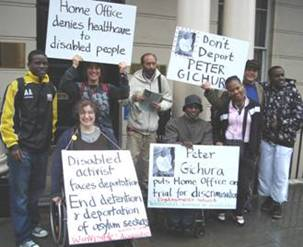
Precedent-setting disability discrimination case will be heard in court.
High Court rules that Home Office and
Kalyx Ltd
are
bound
by 1995 Disability
Discrimination Act.
Peter Gichura, a wheelchair user, can sue over conditions in immigration detention.
High Court rules that anti-discrimination law does apply
In 2006, Peter Gichura was detained twice in Harmondsworth in appalling conditions, including: not being able to use the bathroom and toilet properly and inadequate medical treatment, given the wrong medication.
Under the 1995 Disability Discrimination Act (DDA), which outlaws discrimination in employment, and provision of goods and services, Mr Gichura sued the Home Office (HO) and Kalyx Ltd, the private company which runs Harmondsworth detention centre, for compensation for discriminatory treatment. The HO & Kalyx tried to get the case dropped, claiming that detention for immigration control is exempt from anti-discrimination law.
On 20 May, the High Court ruled that the DDA applies to the services (food, washing facilities, etc.) which a person receives once s/he has been detained. Therefore Mr Gichura’s case should go forward to trial.
This ruling establishes that all disabled prisoners in custody, including those in prison,
before December 2006 (when new regulations came in) do have the protection of anti-discrimination legislation.
In May 2007, the Home Office tried to send Mr Gichura back to Kenya, but were stopped when a judge ruled they could not deport their opponent in a precedent-setting case.
Campaigning with Payday and WinVisible, based at the Crossroads Women's Centre, Mr Gichura has received widespread public sympathy. Anne Owers, HM Chief Inspector of Prisons, condemned the conditions at Harmondsworth as “the poorest report we have issued on an Immigration Removal Centre” (Nov 2006). Conditions at Harmondsworth have also prompted ongoing protests, including hunger strikes, by those being held there.
This ruling comes amid public concern and objection to the brutal treatment meted out by the Home Office, including the deportation of terminally-ill people, the detention and mprisonment
of children, vulnerable women and young people, including those traumatised by rape and other torture and/or with long-term ill-health, mental health problems and other disabilities.
Still at risk of deportation
Peter
Gichura is still at risk of deportation as his claims for asylum – first
on grounds of persecution, and then on his need for accessible living
conditions and medical treatment,
were
refused by the
Home Office.
Given the violence in Kenya, it is shocking that a severely
disabled person who faced anti-Kikuyu persecution can be returned.
